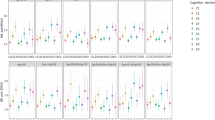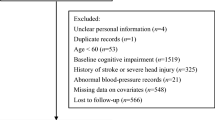Abstract
Background and aims: The primary aim of the present study was to examine whether there is an association between blood pressure and the risk of subsequent cognitive decline in the oldest old. Various factors associated with blood pressure and cognitive function were considered. Methods: The study comprised 599 individuals of a population-based sample, 199 men (mean age at baseline 82.8 years, range 80–95) and 400 women (mean age at baseline 83.3 years, range 80–100). Cognitive function was evaluated by the Mini Mental State Examination (MMSE). For a subgroup of 385 subjects (130 men, 255 women), data were available on blood pressure and MMSE at baseline and two follow-ups at two-year intervals. Baseline blood pressure was studied in one group with reduced cognition and in another group with intact cognition across the following four years. The association of systolic blood pressure (SBP) with the MMSE score through the follow-up period was analysed controlling for frailty (time to death), age, gender, apoprotein E, homocysteine, hypertension, congestive heart failure, and stroke. Results: A medical history of arterial hypertension was associated with lower MMSE scores and a higher prevalence of dementia and cognitive decline at baseline. However, intact cognition through the observation period was associated with higher baseline SBP. This relationship also remained when the frailty of aging subjects, indicated by remaining time to death, was taken into account. Conclusions: Lower SBP in the oldest old is associated with an increased risk of cognitive impairment even after adjustment for compromised vitality. In late life, the risk of cognitive decline needs to be considered in clinical practice.
Similar content being viewed by others
References
Elias MF, Wolf PA, D’Agostino RB, Cobb J, White LR. Untreated blood pressure level is inversely related to cognitive functioning: the Framingham Study. Am J Epidemiol 1993; 138: 353–64.
Launer LJ, Masaki K, Petrovitch H, Foley D, Havlik RJ. The association between midlife blood pressure levels and late-life cognitive function. The Honolulu-Asia Aging Study. JAMA 1995; 274: 1846–51.
Kivipelto M, Helkala EL, Hanninen T, et al. Mid-life vascular risk factors and late-life mild cognitive impairment: a population-based study. Neurology 2001; 56: 1683–9.
Wang JG, Staessen JA. Benefits of antihypertensive treatment in elderly patients with isolated systolic hypertension. Neth J Med 2001; 58: 248–54.
De Champvallins M, Weber F, Collard M, Rancurel G. Incidence and predictive factors of cerebrovascular events in 8,846 elderly treated hypertensive patients during a 3-year follow-up: the Presage study. Eur Neurol 2001; 45: 89–96.
Paran E, Anson O, Reuveni H. Blood pressure and cognitive functioning among independent elderly. Am J Hypertens 2003; 16: 818–26.
Bolster BD Jr, Serfaty JM, Atalar E. In vivo measurement of pulse-wave velocity in small vessels using intravenous MR. Magn Reson Med 2001; 45: 53–60.
Perlmuter LC, Greenberg JJ. Do you mind standing? Cognitive changes in orthostasis. Exp Aging Res 1996; 2: 325–41.
Zuccala G, Onder G, Pedone C, et al. The GIFA-ONLUS Study Group. Hypotension and cognitive impairment: selective association in patients with heart failure. Neurology 2001; 57: 1986–92.
Cacciatore F, Abete P, Ferrara N, et al. Congestive heart failure and cognitive impairment in an older population. Osservatorio Geriatrico Campano Study Group. J Am Geriatr Soc. 1998; 46: 1343–8.
Burke WJ, Coronado PG, Schmitt CA, Gillespie KM, Chung HD. Blood pressure regulation in Alzheimer’s disease. J Auton Nerv Syst 1994; 48: 65–71.
Yamamoto Y, Akiguchi I, Oiwa K, Hayashi M, Imai K. Twenty-four-hour blood pressure changes in the course of lacunar disease. Cerebrovasc Dis 2001; 11: 100–6.
Guo Z, Viitanen M, Fratiglioni L, Winblad B. Low blood pressure and dementia in elderly people: the Kungsholmen project. BMJ 1996; 312: 805–8.
Hogan DB, Ebly EM, Rockwood K. Weight, blood pressure, osmolarity, and glucose levels across various stages of Alzheimer’s disease and vascular dementia. Dement Geriatr Cogn Disorder 1997; 8: 147–51.
Jorgensen H, Anderssen N, Silsand T, Peterson LE. Long-term treatment with slow-release furosemide compared with thiazide treatment in arterial hypertension. J Int Med Res 1989; 17: 552–9.
Mehagnoul-Schipper DJ, Colier WN, Hoefnagels WH, Verheugt FW, Jansen RW. Effects of furosemide versus captopril on postprandial and orthostatic blood pressure and on cerebral oxygenation in patients > or = 70 years of age with heart failure. Am J Cardiol 2002; 90: 596–600.
Skoog I, Andreasson LA, Landahl S, Lernfelt B. A populationbased study on blood pressure and brain atrophy in 85-year-olds. Hypertension 1998; 32: 404–9.
Mayeux R, Small SA, Tang M, Tycko B, Stern Y. Memory performance in healthy elderly without Alzheimer’s disease: effects of time and apolipoprotein-E. Neurobiol Aging 2001; 22: 683–9.
Peila R, White LR, Petrovich H, et al. Joint effect of the APOE gene and midlife SBP on late-life cognitive impairment: the Honolulu-Asia aging study. Stroke 2001; 32: 2882–9.
Alberts MJ, Graffagnino C, McClenny C, et al. ApoE genotype and survival from intracerebral haemorrhage. Lancet 1995; 346: 575.
Kado DM, Karlamangla AS, Huang MH, et al. Homocysteine versus the vitamins folate, B6, and B12 as predictors of cognitive function and decline in older high-functioning adults: MacArthur Studies of Successful Aging. Am J Med. 2005; 118: 161–7.
Clarke R, Smith AD, Jobst KA, Refsum H, Sutton L, Ueland PM. Folate, vitamin B12, and serum total homocysteine levels in confirmed Alzheimer disease. Arch Neurol 1998; 55: 1449–55.
Joosten E, Lesaffre E, Riezler R, et al. Is metabolic evidence for vitamin B-12 and folate deficiency more frequent in elderly patients with Alzheimer’s disease? J Gerontol A Biol Sci Med Sci 1997; 52: M76–9.
Ferrucci L, Cavazzini C, Corsi AM, et al. Biomarkers of frailty in older persons. J Endocrinol Invest 2002; (suppl to no 10): 10–5.
McClearn GE, Johansson B, Berg S, et al. Substantial genetic influence on cognitive abilities in twins 80 or more years old. Science 1997; 276: 1560–3.
Cederlöf R, Lorich U, Untitled. In Nance WE, Allen G, Parisi P, Eds. Twin research: Part C. Biology and epidemiology. New York Alan R. Liss, 1978: 189–95.
Simmons SF, Johansson B, Zarit SH, Ljungquist B, Plomin R, McClearn GE. Selection bias in samples of older twins. A comparison between octogenarian twins and singletons in Sweden. J Aging Health 1997; 9: 553–67.
Swedish Official Statistics. Norstedts förlag AB. Stockholm; 1994.
Nilsson SE, Johansson B, Takkinen S, et al. Does aspirin protect against Alzheimer’s dementia? A study in a Swedish population-based sample aged >80 years. Eur J Clin Pharmacol 2003; 59: 313–9.
Folstein MF, Folstein SE, McHugh PR. “Mini-Mental State”: a practical method for grading the cognitive state of patients for the clinician. J Psychiatr Res 1975; 12: 189–98.
American Psychiatric Association. Diagnostic and statistical manual of mental disorders. DSM-IV 4th ed. Washington. DC, 1994.
WHO Collaborating Centre for Drug Statistics Methodology. Guidelines for ATC classification and DDD assignment. Oslo. Norway. 1996.
World Health Organization. ICD-10. International Statistical Classification of Diseases and Health Problems. 10th rev ed. Geneva; 1992.
Skoog I, Lernfelt B, Landahl S, et al. A 15-year longitudinal study of blood pressure and dementia. Lancet 1996; 347: 1141–5.
Passant U, Warkentin S, Karlson S, et al. Orthostatic hypotension in organic dementia: relationship between blood pressure. cortical blood flow and symptoms. Clin Autonom Res 1996; 6: 29–36.
Ruitenberg A, den Heijer T, Bakker SLM, et al. Cerebral hypoperfusion and clinical onset of dementia: The Rotterdam Study. Ann Neurol 2005; 57: 789–94.
Qiu C. The relation of blood pressure to dementia in the elderly. Thesis. Karolinska University Press. Stockholm 2003.
Skoog I, Lithell H, Hansson L, et al; SCOPE Study Group. Effect of baseline cognitive function and antihypertensive treatment on cognitive and cardiovascular outcomes: Study on Cognition and Prognosis in the Elderly (SCOPE). Am J Hypertens. 2005; 18: 1052–9.
Bulpitt CJ, Beckett NS, Cooke J, et al. Hypertension in the Very Elderly Trial Working Group. Results of the pilot study for the Hypertension in the Very Elderly Trial. J Hypertens 2003; 21: 2409–17.
Kilander L, Boberg M, Lithell H. How do we treat, or not treat, high blood pressure in the oldest old? A practice study in Swedish geriatricians. Blood Press 1997; 6: 372–6.
Suter PM, Haller J, Hany A, Vetter W. Diuretic use: a risk for subclinical thiamine deficiency in elderly patients. J Nutr Health Aging 2000; 4: 69–71.
Nilsson SE, Takkinen S, Tryding N, et al. Association of biochemical values with morbidity in the elderly: a population-based Swedish study of persons aged 82 or more years. Scand J Clin Lab Invest 2003; 63: 1–10.
McKhann G, Drachman D, Folstein M, Katzman R, Price D, Stadlan EM. Clinical diagnosis of Alzheimer’s disease: Report of the NINCDS-ADRA Work group under the auspices of the Department of Health and Human Services Task Force on Alzheimer’s disease. Neurology 1984; 34: 939–44.
Author information
Authors and Affiliations
Corresponding author
Rights and permissions
About this article
Cite this article
Nilsson, S.E., Read, S., Berg, S. et al. Low systolic blood pressure is associated with impaired cognitive function in the oldest old: longitudinal observations in a population-based sample 80 years and older. Aging Clin Exp Res 19, 41–47 (2007). https://doi.org/10.1007/BF03325209
Received:
Accepted:
Published:
Issue Date:
DOI: https://doi.org/10.1007/BF03325209




